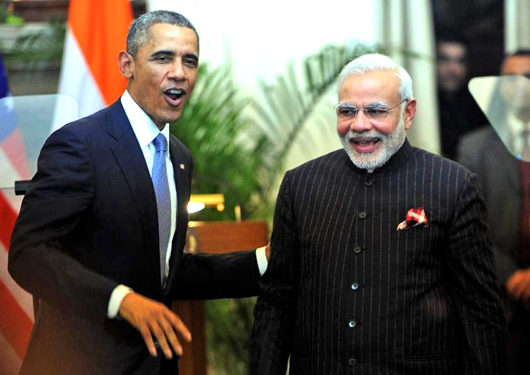
New Delhi, Jan 27: "Sisters and brothers of India", is how US President Barack Obama addressed a town hall style gathering here Tuesday, stressing that the ties between the two countries can be the "defining partnership of the century".
In his speech at the Siri Fort Auditorium before a gathering largely comprising young people, students, NGOs and diplomats, Obama said: "I believe that the relationship between India and the US can become the defining partnership of the century".
He said he is "optimistic of the future" of the two countries and added that he is proud to be India's partner, "proud to be your friend".
Obama struck a personal chord with the mainly youthful crowd, saying he was very impressed with the daredevilry of the motorcycle contingent riding Royal Enfield bikes and wished he could ride a bike too.
"But the Secret Service does not let me ride motor cycles", and also remarked that he cannot dance as well as his wife Michelle.
In a speech where he touched on the need for India and the US to work together on climate change, on how the US can partner India in its growth story, in defence cooperation and becoming partners in the security of the Asia-Pacific region, the American president also stressed on the need for the government to uphold the freedom of religion written in the constitution.
He recalled Swami Vivekananda and his speech in Chicago where he addressed the gathering as "Sisters and brothers of America" and said he is going to address the audience likewise, and said "Sisters and brothers of India", and repeated it again in the middle of the speech.
Obama also touched on human rights and the important role of women in building homes, societies. "We must work for a society where everybody has a chance, everybody who can work, and that includes our women," he said.
He mentioned his wife Michelle who accompanied him to the auditorium and said :"I am married to a very strong and talented women, Michelle is not afraid to speak her mind to me", and added that he is proud of his two daughters. He also said it is necessary to ensure women can walk the streets with safety and security.
He also said he was happy to see so many women commanding contingents in the Republic Day parade and specially mentioned the woman who commanded the guard of honour accorded to him at Rashtrapati Bhavan Jan 25.
Obama recounted how in his last visit he had visited the Humayun's Tomb and met the families of some labourers working there.
The little son of one of them, Vishal, is today a 16-year old, he said, and added he was happy to note that Vishal today studies and dreams of joining the armed forces "an example of the talent that is here".
The teenager and his family were in the auditorium.
Ahead of his speech, Obama and his wife met Nobel Peace prize winner Kailash Satyarthi at the auditorium as well as some of the NGOs.
To the end of the speech, where he was cheered loudly by the audience, Obama and Michelle held hands and mixed with the enthusiastic crowd.





Comments
Add new comment